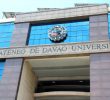“eUP’s goal is an integrated, interconnected, harmonized, inter-operable ICT system and infrastructure across all UP campuses to support its thrust for academic and operational excellence.”– Elvie Zamora, UP’s Vice President for Development
By JOHN RIZLE L. SALIGUMBA
Davao Today
DAVAO CITY, Philippines — “The guiding spirit of the university is ‘One-University, One-UP.’ We must be able to work together, support the same standards and be able to share resources,” said Elvie Zamora, Vice-President for Development of the University of the Philippines (UP) during their eUP initiative kick-off on Wednesday.
Zamora said, eUP’s goal is “an integrated, interconnected, harmonized, inter-operable ICT (Information and Communications Technology) system and infrastructure across all UP campuses to support its thrust for academic and operational excellence.”
It plans to connect all of UP’s current 15 campuses. The UP system is comprised of seven constituent universities and an autonomous college in Cebu. A constituent university has one or more campus.
The initiative is part of UP’s strategic plan which gives emphasis on Academic Excellence and Operational Excellence. It involves administrative efficiency and financial sustainability to which the initiative may help through creating an “enabling environment.”
“Administrative efficiency means sound decision-making based on real-time and accurate information,” Zamora said, putting emphasis on the optimization of data gathering.
She shared, their president had to wait for the submission of information through the most advanced form, the electronic mail or through hard copies and personal delivery.
“This type of data gathering for coming-up with decisions is not optimal,” said Zamora.
Meanwhile, Doctor Jimmy Caro, the Assistant Vice-President for the initiative said that the development of the ICT infrastructure would mean the upgrade of computers, computer laboratories, the fiber-optic backbone and the installation of video-conferencing equipment for the whole university.
A part of software will be developed by UP, but critical systems which needs to be installed immediately are top-of-the-line systems.
The bidding for core programs needed to run the project was won by ePLDT (Philippine Long Distance Telephone Company), which will use different Oracle suites for every management system.
The ICT system features online access and processing of the whole student life-cycle from enrolment to graduation and beyond.
Students can now enrol, pay, apply for admission and scholarship, view grades, submit requirements and interact online; while Alumni can transfer records, continue to receive e-mail from the university and update their contact details.
The estimated expense of the eUP project, so far, has reached 750 million pesos (USD 17.88 M).
“It will not be taken from the regular annual budget but will be taken partly from reprogrammed funds,” Zamora said, adding that “a large portion of some funds which have not been programmed by the university is allocated to eUP.”
He added, there’s an additional funding from the Commission on Higher Education and the Department of Budget and Management.
“If there are new needs, we will have an evaluation then present it to the president thru the Vice-President for Planning and Finance,” Zamora said, as he confirmed that the initiative has no budget cap.
Zamora said they have gone around the university campuses to present eUP and the president’s strategic plan.
“This is a welcome development for us. We are not against these kinds of development most especially at this electronic age. It is also true that computerization brings speed and efficiency,” said Einstein Recedes, Secretary-General of Kabataan Partylist.
However, he expressed apprehensions on additional fees and security.
“We fear that it might appear in the form-5s of UP students, or the collection of additional fees. Students shouldn’t be made to pay for it,” Recedes said.
They are also cautious that it might encroach on confidentiality given that UP students, he said, “are critical of the administration.” (John Rizle L. Saligumba/davaotoday.com)










